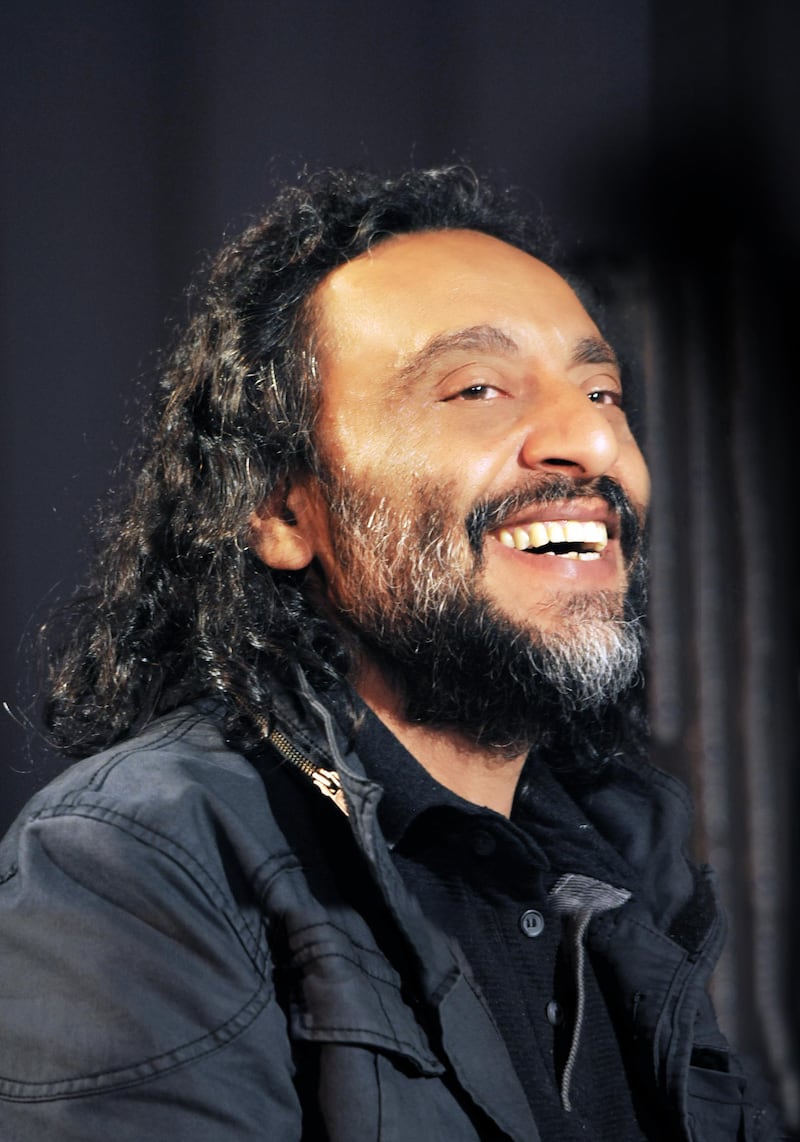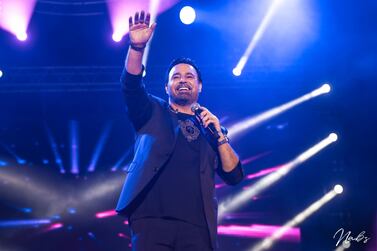Deep in downtown Cairo lies an apartment that houses a glittering piece of Arabic music history – not that many people know it when they see it. As Fathy Salama tells it, some of his friends don't even know what a Grammy award is. "It doesn't matter too much," he says with a shrug. "But I keep it here in my apartment on the shelf," he adds, pointing at his award. "While I didn't do music to get awards, I am proud that I got it. To get an award that is judged by your peers is important."
The gong Salama refers to is the 2004 Best Contemporary World Music Album, which he received for his production work on Youssou N'Dour's Sufi-inspired album, Egypt.
It remains, shockingly, the only Grammy award given to an individual artist from the Arab world and is proof of Salama’s international status as an acclaimed composer and artist. (Paula Abdul, whose father is Syrian, and Shakira, whose father is Lebanese, have also won Grammy Awards but are not Arab nationals.)
But more prominent is his regional reputation as a pioneer of modern Arabic pop. It was Salama, as a producer and songwriter, who helped usher in a sea of change for Egyptian pop music. Through his early 1980s production work, with at the time little-known artists such as Amr Diab and Mohamed Mounir, he pushed the scene towards embracing a new and dynamic Arabic sound far removed from the orchestral flourishes of their predecessors.
UAE fans are set to sample his signature genre fusion when the Egyptian artist performs at NYU Abu Dhabi Arts Centre tomorrow. Intriguingly titled Sufism versus Modernism, the concert will see Salama lead a band that will perform alongside the renowned Egyptian Sufi chanter, Sheikh Mahmoud Tohamy. It is a concept the duo have been touring for nearly a year, including at a recent packed show at the Cairo Opera House.
Like his work with N'Dour, Salama explains that this concert is about displaying the links between the sacred art form with contemporary Arabic music. "Traditional music can often be rigid in a way and that is not necessarily a bad thing. What I have always tried to do is respect the traditional base of the music and try to push it forward a bit. I just want to give it a new kind of texture," he says. "Also I am showing how modern Arabic music, with its melodies, is also linked to various traditional styles, including mawlids."
Salama is referring to the Sufi gathering in which the Prophet Mohammed is praised through melodic verse and chants, the meditative qualities of which he experienced first-hand as a child in Cairo.
“These gatherings were well-known, and what I remember most about them is how people from outside of Cairo came from the villages,” he says. “What I loved the most about it was how calming it all was. When it comes to the music, I was also listening and analysing how it sounds to Arabic music generally at the time.”
That early creative spirit was engendered in his household: Salama recalls a childhood home filled with an eclectic variety of music. "My parents were open to all styles," he says. "We would listen to the old Arabic music of Umm Kulthum, Mohammed Abdel Wahab and Farid Al-Atrash, and then we would also listen to Beethoven and Bach."
And with an extra appreciation for 1960s and 1970s rock thrown into the mix, Salama began gigging as a teenager in Cairo clubs and performing Deep Purple and Rolling Stones songs with cover bands. All of these influences came together when Salama began his career as a producer and songwriter for hire. He recalls the late 1970s and early 1980s as a period when Egyptian pop music was stagnating.
“There was this sense that it wasn’t challenging and that it was diminishing,” he says. “I think people felt it, and there was this feeling that people were looking for something new.” Those sentiments were shared with the likes of future mega stars Mounir and Diab when they entered the studio to work with Salama.
The hits he produced for them, Shababeek and Zaytouni respectively, helped establish a new Egyptian pop sound, one that fused oriental melodies and western rock and jazz rhythms. That seismic shift is still heard today in the modern sounds of current Arab pop artists.
Not that Salama is happy with its current state. “It is not interesting at all. The music that is happening today, you can just tell that it is written with business in mind. It’s all about how many likes or views you can get with this song on social media,” he says. “The creativity is gone and I don’t know if it will come back for a while, to be honest.”
While Salama went on to work on more esoteric Grammy-Award-winning sounds, does he feel a sense of responsibility for its decaying state? "I don't think so, because I never intended to make music in a pop style. I never believed in these labels in the first place," he says. "What I am interested in then, and now, is in pushing things forward and trying new things with the music. What I am talking about is a way of thinking, which I can't see in today's scene at the moment."
Sufism versus Modernism, featuring Fathy Salama with Sheikh Tohamy, takes place Thursday, September 26. The show starts at 8pm and tickets cost Dh150. More information is available at www.nyuad-artscenter.org.







